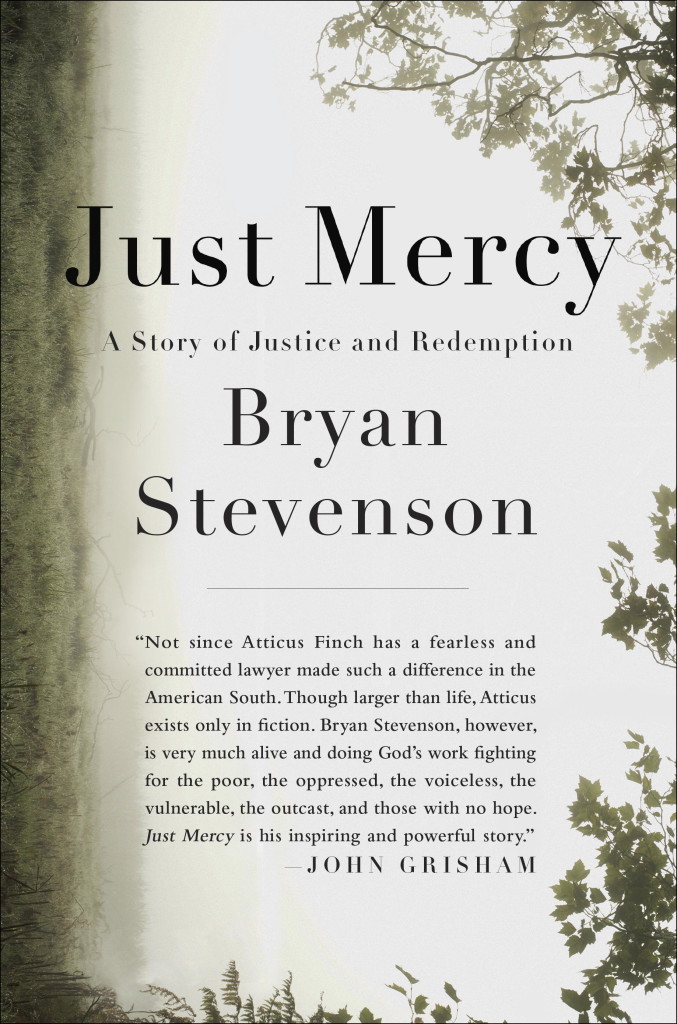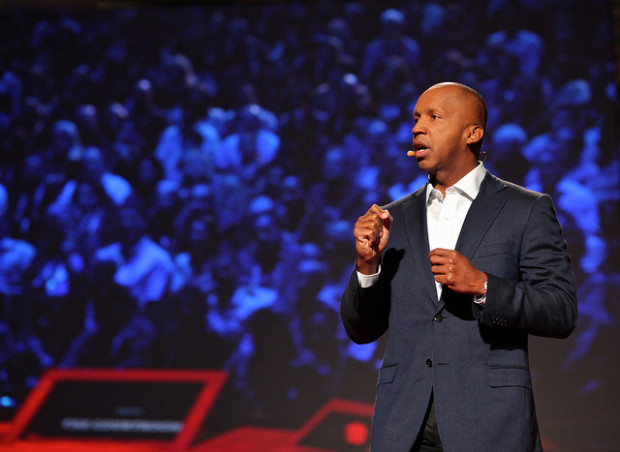“You’ve got to keep beating the drum for justice.” (page 46)
Just Mercy by Bryan Stevenson should be required reading for every American. Everyone.

I first heard of this book, and its wonderful author, a few weeks ago when we went to a taping of The Daily Show, and Bryan Stevenson was the guest. Bryan Stevenson helped found the Equal Justice Initiative and works as their executive director, as well as teaching at NYU Law School.
If you’d like, watch the full interview to see why I left the taping completely in awe of how awesome he is, and eager to read his book.
A good description of what the Equal Justice Initiative does can be found in the book, when he describes what he said to Rosa Parks years ago when they first met:
“Well, I have a law project called the Equal Justice Initiative, and we’re trying to help people on death row. We’ve trying to stop the death penalty, actually. We’re trying to do something about prison conditions and excessive punishment. We want to free people who’ve been wrongly convicted. We want to end unfair sentences in criminal cases and stop racial bias in criminal justice. We’re trying to help the poor and do something about indigent defense and the fact that people don’t get the legal help they need. We’re trying to help people who are mentally ill. We’re trying to stop them from putting children in adult jails and prisons. We’re trying to do something about poverty and the hopelessness that dominates that dominates poor communities. We want to see more diversity in decision-making roles in the justice system. We’re trying to educate people about racial history and the need for racial justice. We’re trying to confront abuse of power by police and prosecutors —“
[…]
Ms. Parks leaned back, smiling. “Ooooh, honey, all that’s going to make you tired, tired, tired.” (pages 292-293)
That’s a lot. And not surprisingly, it hasn’t been easy.
This book is full of examples of the important work that Bryan Stevenson and the EJI have done over the years. Their victories and defeats. Acknowledgement of the much needed progress that has been made so far and the need to continue fighting for much more progress and justice. And most of all – WHY this work is important. To every American.
I know that sometimes we can shy away from reading books that talk about difficult topics, things that we know will be emotionally taxing to immerse ourselves in. But it’s important that we do read them. It’s important that we read books about people who are not as fortunate as we have been, situations we’re fortunate to not be in, people who need our attention and compassion rather than heads turned away from uncomfortable realities, justice we need to beat our drums for.
It’s not always an easy book to read. I had tears streaming down my face while reading stories of injustice in the beginning of the book. By the middle I had different tears – tears of joy as I read a heartwarming story that involved a chocolate milkshake and people’s capacity to change for the better. There may have been more tears again before I reached the end. But I couldn’t put it down.
“When I first went to death row in December 1983, America was in the early stages of a radical transformation that would turn us into an unprecedentedly harsh and punitive nation and result in mass imprisonment that has no historical parallel. Today we have the highest rate of incarceration in the world. The prison population has increased from 300,000 people in the early 1970s to 2.3 million people today. There are nearly six million people on probation or on parole. One in every 15 people born in the United States in 2001 is expected to go to jail or prison; one in every three black male babies born in this century is expected to be incarcerated.” (pages 14-15)
This book reminds us that no matter who we are or what we do for a living, we need to wake up and fight every day for justice and equality. Most of us who are not lawyers, law enforcement or legislators will do this in small ways. That’s ok. It’s just important that we keep doing it. Every day.
Education about the progress we’ve made and the work we still need to do is very important. This book greatly helps advance that education.
I recommend Just Mercy to everyone. Buy it from an Indie bookstore. Or check it out from your library. Or buy the ebook. Or listen to Bryan Stevenson read it to you himself with the audiobook edition (he’s a great narrator).
“I’ve come to believe that the true measure of our commitment to justice, the character of our society, our commitment to the rule of law, fairness, and equality cannot be measured by how we treat the rich, the powerful, the privileged, and the respected among us. The true measure of our character is how we treat the poor, the disfavored, the accused, the incarcerated, and the condemned.” (page 18)
“We are bodies of broken bones. I guess I’d always known but never fully considered that being broken is what makes us human. We all have our reasons. Sometimes we’re fractured by the choices we make; sometimes we’re shattered by things we would never have chosen. But our brokenness is also the source of our common humanity, the basis for our shared search for comfort, meaning, and healing. Our shared vulnerability and imperfection nurtures and sustains our capacity for compassion.” (page 289)
//
Main image is American Justice by Steve Jurvetson on Flickr (CC BY 2.0)

Oh, this does sound really good! And wonderful review too!
Yes, yes, and more yes. This is such a good read. Did you see his recent interview for The Marshall Project? I think you’d really enjoy it! https://www.themarshallproject.org/2015/06/24/bryan-stevenson-on-charleston-and-our-real-problem-with-race
I hadn’t seen this yet! Thank you so much for sharing. Have saved it to my Instapaper and going to read it while driving (well, riding – I don’t read and drive!) back to NYC today.